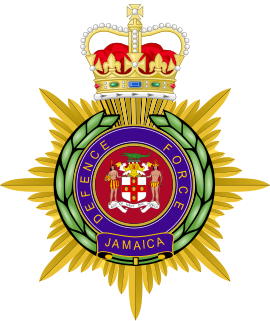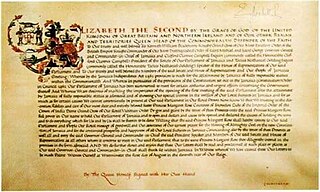
Queen Nanny, Granny Nanny or Nanny of the Maroons ONH, was an 18th-century leader of the Jamaican Maroons. She led a community of formerly enslaved Africans called the Windward Maroons. In the early 18th century, under the leadership of Nanny, the Windward Maroons fought a guerrilla war over many years against British authorities in the Colony of Jamaica in what became known as the First Maroon War.

The Jamaica Defence Force (JDF) is the combined military of Jamaica, consisting of an infantry Regiment and Reserve Corps, an Air Wing, a Coast Guard fleet and a supporting Engineering Unit. The JDF is based upon the British military model, with similar organisation, training, weapons and traditions. Once chosen, officer candidates are sent to one of several British or Canadian basic officer courses depending upon the arm of service. Enlisted soldiers are given basic training at JDF Training Depot Newcastle. As on the British model, NCOs are given several levels of professional training as they rise up the ranks. Additional military schools are available for speciality training in Canada, China, the United States, and the United Kingdom.

The West India Regiments (WIR) were infantry units of the British Army recruited from and normally stationed in the British colonies of the Caribbean between 1795 and 1927. In 1888 the two West India Regiments then in existence were reduced to a single unit of two battalions. This regiment differed from similar forces raised in other parts of the British Empire in that it formed an integral part of the regular British Army. In 1958 a new regiment was created following the creation of the Federation of the West Indies with the establishment of three battalions, however, the regiment's existence was short-lived and it was disbanded in 1962 when its personnel were used to establish other units in Jamaica and Trinidad and Tobago. Throughout their history, the regiments were involved in a number of campaigns in the West Indies and Africa, and also took part in the First World War, where they served in the Middle East and East Africa.
Morris Cargill CD was a Jamaican lawyer, businessman, planter, journalist and novelist.

Hanover is a parish located on the northwestern tip of the island of Jamaica. It is a part of the county of Cornwall, bordered by St. James in the east and Westmoreland in the south. With the exception of Kingston, it is the smallest parish on the island. Hanover is the birth parish of Alexander Bustamante, labour leader, first head of government of Jamaica under universal suffrage, and one of seven Jamaican National Heroes. Its capital is Lucea.

Lucea is a coastal town in Jamaica and the capital of the parish of Hanover.

Lawrence Washington (1718–1752) was an American soldier, planter, politician, and prominent landowner in colonial Virginia. As a founding member of the Ohio Company of Virginia, and a member of the colonial legislature representing Fairfax County, he also founded the town of Alexandria, Virginia on the banks of the Potomac River in 1749.

The Caribbean Regiment was a regiment of the British Army during the Second World War. The regiment went overseas in July 1944 and saw service in the Italy, Egypt and Palestine.
Sir Kenneth Octavius Hall served as the governor-general of Jamaica from 16 February 2006 to 26 February 2009. He was Jamaica's fifth governor-general since independence in 1962.
Indo-Jamaicans are the descendants of people who came from the Indian subcontinent to Jamaica. Indians form the third largest ethnic group in Jamaica after Africans and Multiracials.
George Blackman was born in Barbados and served as a Private in the 4th British West Indies Regiment during the First World War. Following the death of former Jamaican soldier Eugent Clarke in 2002, George Blackman was the last living man from the Caribbean who was known to have served in the Great War.
Miss Jamaica World is a national beauty pageant in Jamaica that selects a contestant to represent the country in the Miss World beauty pageant.
Lieutenant John Albert Edward Robertson Daley was a British World War I flying ace credited with six aerial victories.

The British West Indies Regiment was a unit of the British Army during the First World War, formed from volunteers from British colonies in the West Indies.

Jamaica was an English colony from 1655, and a British colony from 1707 until 1962, when it became independent. Jamaica became a Crown colony in 1866.

The Colony of Jamaica gained independence from the United Kingdom on 6 August 1962. In Jamaica, this date is celebrated as Independence Day, a national holiday.

Constance Winifred Mark, MBE, BEM was a Jamaican-born community organiser and activist. She served as a medical secretary in the Auxiliary Territorial Service in World War II. After moving to England in the early 1950s, she became an activist for West Indians in London, after being denied her British Empire Medal. She worked to gain recognition for Black service personnel who were overlooked for their services and co-founded the Mary Seacole Memorial Association to bring recognition to the accomplishments of the noted Jamaican nurse.
Horace Arthur "Tony" Ableton was a comedic performer in Jamaica and World War I veteran of the British West Indies Regiment (B.W.I.R.) He partnered with Ernest Cupidon in the duo "Cupes and Abes" during the 1920s and 1930s. Ableton was born in Spanish Town, Jamaica and attended Beckford and Smith. He joined the B.W.I.R during World War I and served in the 2nd Battalion. He was deployed to England, France, Egypt and Palestine and became an M.B.E. in the Queen's Birthday Honours in 1963.

Rusea's High School in Lucea, Hanover, Jamaica, established in 1777, is the fourth oldest, continuously operated high school in Jamaica, after Wolmer's Boys', one of the Wolmer's Schools (1729), Manning's School (1738) and St. Jago High School (1744).
Royal tours of Jamaica by the Jamaican Royal Family have been taking place since the 20th century. The Queen of Jamaica, Elizabeth II, has visited the island six times; in 1953, 1966, 1975, 1983, 1994, and 2002. Other members of the Royal Family have also paid visits.












